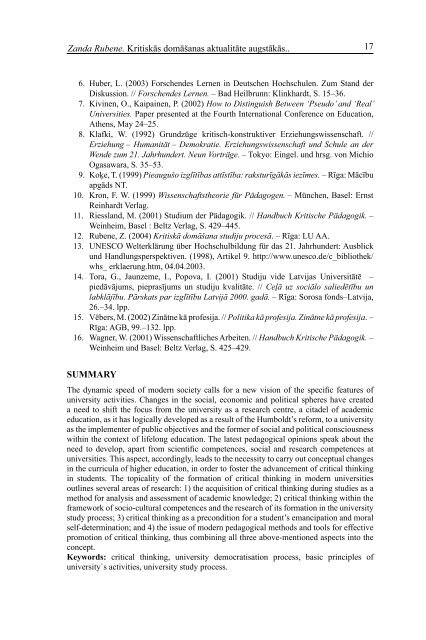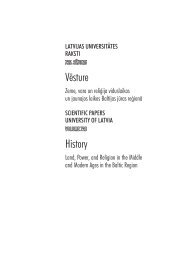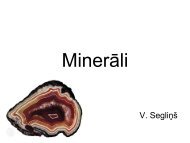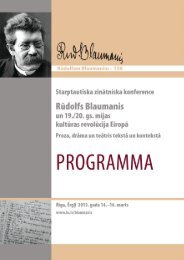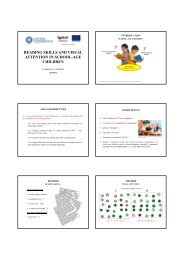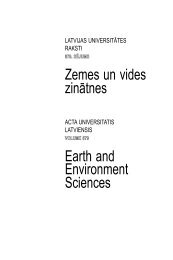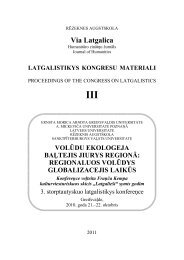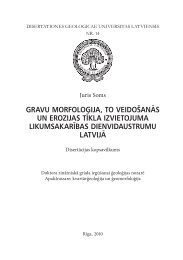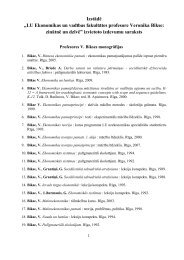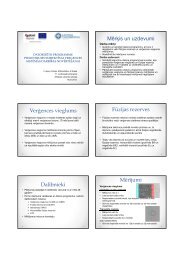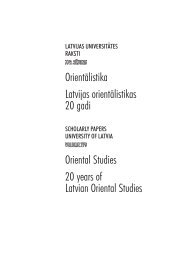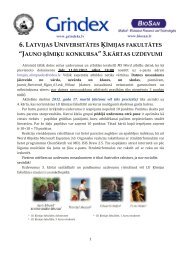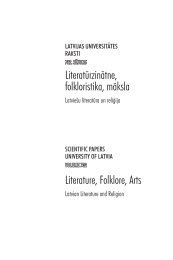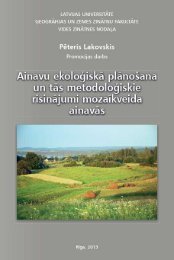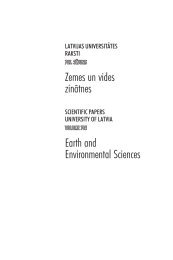Viltusdraugi - Latvijas Universitāte
Viltusdraugi - Latvijas Universitāte
Viltusdraugi - Latvijas Universitāte
You also want an ePaper? Increase the reach of your titles
YUMPU automatically turns print PDFs into web optimized ePapers that Google loves.
Zanda Rubene. Kritiskās domāšanas aktualitāte augstākās..<br />
6. Huber, L. (2003) Forschendes Lernen in Deutschen Hochschulen. Zum Stand der<br />
Diskussion. // Forschendes Lernen. – Bad Heilbrunn: Klinkhardt, S. 15–36.<br />
7. Kivinen, O., Kaipainen, P. (2002) How to Distinguish Between ‘Pseudo’ and ‘Real’<br />
Universities. Paper presented at the Fourth International Conference on Education,<br />
Athens, May 24–25.<br />
8. Klafki, W. (1992) Grundzüge kritisch-konstruktiver Erziehungswissenschaft. //<br />
Erziehung – Humanität – Demokratie. Erziehungswissenschaft und Schule an der<br />
Wende zum 21. Jahrhundert. Neun Vorträge. – Tokyo: Eingel. und hrsg. von Michio<br />
Ogasawara, S. 35–53.<br />
9. Koķe, T. (1999) Pieaugušo izglītības attīstība: raksturīgākās iezīmes. – Rīga: Mācību<br />
apgāds NT.<br />
10. Kron, F. W. (1999) Wissenschaftstheorie für Pädagogen. – München, Basel: Ernst<br />
Reinhardt Verlag.<br />
11. Riessland, M. (2001) Studium der Pädagogik. // Handbuch Kritische Pädagogik. –<br />
Weinheim, Basel : Beltz Verlag, S. 429–445.<br />
12. Rubene, Z. (2004) Kritiskā domāšana studiju procesā. – Rīga: LU AA.<br />
13. UNESCO Welterklärung über Hochschulbildung für das 21. Jahrhundert: Ausblick<br />
und Handlungsperspektiven. (1998), Artikel 9. http://www.unesco.de/c_bibliothek/<br />
whs_ erklaerung.htm, 04.04.2003.<br />
14. Tora, G., Jaunzeme, I., Popova, I. (2001) Studiju vide <strong>Latvijas</strong> Universitātē –<br />
piedāvājums, pieprasījums un studiju kvalitāte. // Ceļā uz sociālo saliedētību un<br />
labklājību. Pārskats par izglītību Latvijā 2000. gadā. – Rīga: Sorosa fonds–Latvija,<br />
26.–34. lpp.<br />
15. Vēbers, M. (2002) Zinātne kā profesija. // Politika kā profesija. Zinātne kā profesija. –<br />
Rīga: AGB, 99.–132. lpp.<br />
16. Wagner, W. (2001) Wissenschaftliches Arbeiten. // Handbuch Kritische Pädagogik. –<br />
Weinheim und Basel: Beltz Verlag, S. 425–429.<br />
SUMMARY<br />
The dynamic speed of modern society calls for a new vision of the specific features of<br />
university activities. Changes in the social, economic and political spheres have created<br />
a need to shift the focus from the university as a research centre, a citadel of academic<br />
education, as it has logically developed as a result of the Humboldt’s reform, to a university<br />
as the implementer of public objectives and the former of social and political consciousness<br />
within the context of lifelong education. The latest pedagogical opinions speak about the<br />
need to develop, apart from scientific competences, social and research competences at<br />
universities. This aspect, accordingly, leads to the necessity to carry out conceptual changes<br />
in the curricula of higher education, in order to foster the advancement of critical thinking<br />
in students. The topicality of the formation of critical thinking in modern universities<br />
outlines several areas of research: 1) the acquisition of critical thinking during studies as a<br />
method for analysis and assessment of academic knowledge; 2) critical thinking within the<br />
framework of socio-cultural competences and the research of its formation in the university<br />
study process; 3) critical thinking as a precondition for a student’s emancipation and moral<br />
self-determination; and 4) the issue of modern pedagogical methods and tools for effective<br />
promotion of critical thinking, thus combining all three above-mentioned aspects into the<br />
concept.<br />
Keywords: critical thinking, university democratisation process, basic principles of<br />
university`s activities, university study process.<br />
17


